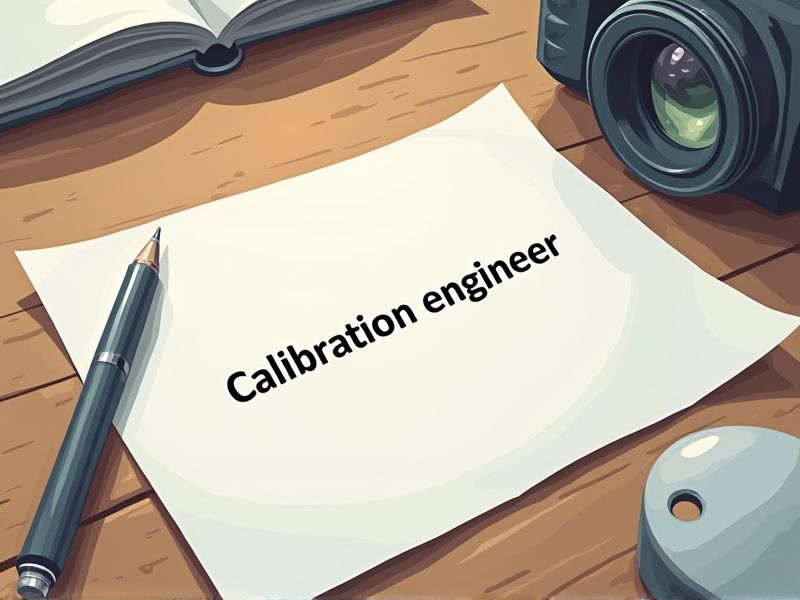
Calibration engineers are responsible for ensuring precision in the measurement instruments used across various industries, which impacts product quality and safety. Certifications provide validation of their competence, ensuring adherence to industry standards and best practices. Acquiring the right certifications enhances their credibility and helps in the efficient diagnosis and correction of discrepancies within measurement tools. Consider obtaining these critical certifications for a career as a calibration engineer.
ASQ Certified Calibration Technician (CCT)
Certification as an ASQ Certified Calibration Technician (CCT) elevates a calibration engineer's credibility, ensuring adherence to industry standards and best practices. This credential demonstrates proficiency in calibration processes, which directly impacts the accuracy and reliability of measurements. Organizations benefit from hiring CCT-certified engineers as they enhance quality assurance and reduce errors in product manufacturing. The certification reinforces engineers' skills in maintaining equipment precision, thereby decreasing operational downtime and increasing efficiency.
ISO/IEC 17025 Laboratory Accreditation Training
Calibration engineers need ISO/IEC 17025 Laboratory Accreditation Training because it ensures they understand international standards for competence in testing and calibration. Acquiring this training improves their ability to produce valid and reliable measurement results, which enhances global trust in their work. Without such training, engineers might lack the skills required to maintain the traceability and accuracy crucial in their field. Trained engineers contribute to minimizing errors and enhancing quality, which is essential for organizational competitiveness and compliance.
NIST Calibration Certification
NIST Calibration Certification ensures traceability to national standards, offering credibility to the calibration processes conducted by engineers. It promotes accuracy and consistency in measurements, critical for quality assurance in various industries. Clients and regulatory bodies often require proof of NIST-certified calibration to meet compliance and industry standards. Possessing such certification enhances an engineer's professional reputation and trustworthiness in delivering reliable calibration services.
Certified Calibration Engineer (CCE)
A Certified Calibration Engineer (CCE) is needed to ensure accuracy and precision in measurement instruments, reducing operational risks. Possessing a CCE enhances a calibration engineer's credibility, improving organizational compliance with industry standards. Certification provides structured knowledge, enabling engineers to diagnose and address complex calibration issues effectively. With consistent calibration practices, businesses often experience increased equipment longevity and reliability, leading to cost savings.
ASQ Certified Quality Engineer (CQE)
Having ASQ Certified Quality Engineer (CQE) certification enhances a calibration engineer's understanding of quality management principles, which leads to improved process accuracy and consistency. This certification provides the skills for statistical analysis, enabling calibration engineers to identify and reduce variability in measurement systems. Employers often prefer or require ASQ CQE certification as it denotes a standardized level of competence and commitment to quality. The certification equips calibration engineers with problem-solving techniques that directly impact the reliability and performance of calibrated instruments.
ISO 9001 Lead Auditor Certification
Having an ISO 9001 Lead Auditor Certification enhances a calibration engineer's credibility since it signifies a strong understanding of quality management systems. The certification helps ensure that the engineer is adept at conducting internal audits, which is critical for maintaining measurement accuracy and standards compliance. It also equips the engineer with the skills necessary to identify process improvements, reducing errors and increasing efficiency in calibration procedures. Employers often seek this certification to ensure their teams can effectively manage quality control, leading to better customer satisfaction and operational success.
Metrology and Measurement Systems Certification
Obtaining Metrology and Measurement Systems Certification ensures that a calibration engineer possesses standardized skills and knowledge crucial for maintaining measurement accuracy. Accurate measurements lead to reliable data, which is essential for quality assurance across industries such as aerospace, automotive, and manufacturing. Certification often assures employers and clients of an engineer's proficiency, thus enhancing trust and reducing the risk of errors in critical systems. Additionally, this certification keeps engineers updated on the latest technological advancements and industry standards, fostering continuous improvement in their professional practices.
NICET Instrumentation and Control Certification
NICET Instrumentation and Control Certification validates a calibration engineer's technical competencies and enhances professional credibility. This certification often leads to increased job opportunities and higher salary potential in industrial sectors. Employers may prioritize candidates with this certification due to its indication of standardized skill and knowledge. Regulatory bodies and clients frequently regard certified professionals as more reliable for compliance and safety-related tasks.
Lean Six Sigma Green Belt
Lean Six Sigma Green Belt provides calibration engineers with tools to identify and eliminate inefficiencies. This leads to more precise calibration processes and enhances accuracy. Training enhances problem-solving abilities, crucial for diagnosing calibration errors. Improved efficiency and accuracy result in reduced costs and increased productivity for engineering projects.
Certified Reliability Engineer (CRE)
Calibration engineers focus on ensuring the accuracy of measuring instruments but may lack expertise in analyzing long-term equipment reliability. A Certified Reliability Engineer (CRE) brings advanced skills in identifying potential failure modes and optimizing maintenance strategies. CREs apply statistical methods to predict equipment performance and mitigate risks, leading to more consistent calibration processes. Hiring a CRE enhances the calibration team's ability to maintain high equipment uptime and reduce costly downtimes.
Summary
When you as a calibration engineer obtain relevant certifications, your credibility and technical skills are significantly enhanced. This advancement leads to increased job opportunities and career progression within your field. Employers are likely to recognize your proficiency, resulting in higher job security and potential salary increments. Certified engineers often contribute more effectively to project accuracy and efficiency, benefiting both the organization and personal growth.
